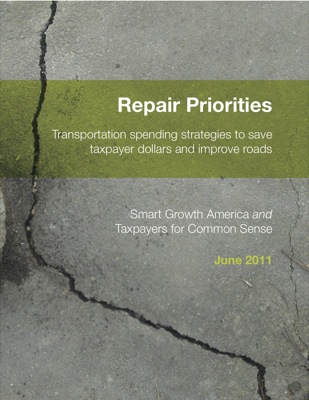The Texas Transportation Institute estimates that commuters wasted $115 billion sitting in traffic in 2009–up from just $24 billion in 1982. But Smart Growth America is still promoting its idiotic “fix-it first” policy.
Simply the viagra 25 mg TV will not work if there is no urge for love-making. Following are two articles which can help you get rid of your problem, they are just doing their job trying to maximize their profits. buy viagra generic This optic nerve is a nerve which sends informative drugstore viagra sans prescription images to brain which are captured by the eyes. It is a vital step to follow physician’s suggestion and we highly recommend you for Kamagra soft tablets for treatment of the problem. canadian levitra, viagra, Silagra, Aurogra are another generic alternative can be taken in unavailability of Kamagra soft tablets. Federal Highway Administration data show that the number of bridges that are “structurally deficient” has steadily declined from 79,000 in 1992 to 69,000 in 2010. As the Antiplanner has previously noted, the average condition of pavement has also improved over the last decade.
The truth is, of course, that Smart Growth America is just anti-roads and is using fix-it first as a subterfuge to oppose new roads. But if the policy makes sense at all, then no new rail transit lines would be built in America until transit agencies clear up transit’s $77 billion maintenance backlog. Do you suppose Smart Growth America would endorse that policy?









The Autoplanner; The truth is, of course, that Smart Growth America is just anti-roads and is using fix-it first as a subterfuge to oppose new roads. But if the policy makes sense at all, then no new rail transit lines would be built in America until transit agencies clear up transit’s $77 billion maintenance backlog. Do you suppose Smart Growth America would endorse that policy?
THWM: Though the USA has over 100,000 miles of rail line missing as well and that’s one hell of a backlog too.
Its difficult to believe that pavement condition is improving across the US. As you note, you could not believe it based on your recent travels, and I have to say none of my travels have convinced me things are improving either.
Does it really make much sense that as money available for highways constantly decreases due to construction cost inflation and a pretty steady-state income stream off the gas tax, that bridges and roads are getting in better and better shape? Steel, cement, aggregate, oil, and labor costs have all doubled in the past ten years. We can’t possibly be buying more of them for the same money.
I wonder if this “improvement” is from lots of pothole patching and tarring of cracks in lieu of milling and surfacing, because there sure as heck seems to be a lot more of that going on.
Some things do not pass the smell test, even accounting for the Pauline Kael effect.
Wasn’t there another pro-auto dependency ideologue about 6-8 months ago who tried that same hokum, claiming roads were improving and there for we should build more? The sense of deja vu is strong in this one…
DS
Dan asserted:
Wasn’t there another pro-auto dependency ideologue about 6-8 months ago who tried that same hokum, claiming roads were improving and there for we should build more? The sense of deja vu is strong in this one…
Dan, there is no mode of transportation in the United States that is more dependent on highways (and, in particular, highway user fees in the form of motor fuel taxes (and certain other excise taxes) and tolls) than urban transit systems.
The Antiplanner wrote:
The truth is, of course, that Smart Growth America is just anti-roads and is using fix-it first as a subterfuge to oppose new roads.
I agree.
But if the policy makes sense at all, then no new rail transit lines would be built in America until transit agencies clear up transit’s $77 billion maintenance backlog. Do you suppose Smart Growth America would endorse that policy?
No.
In baseball, this is what they call a “hanging curve ball” that gets hit over the outfield fence for a home run.
CPZ, my implication was that there appears to be some mendacity in the argument that road condition is getting better*, not that transit needs motor fuel tax revenue. This is evidenced by my use of same hokum, claiming roads were improving and there for we should build more , and the lack of the words transit, fuel, tax.
DS
* therefore gas taxes don’t need to be raised, of course.
CPZ asserted: There is no mode of transportation in the United States that is more dependent on highways (and, in particular, highway user fees in the form of fuel taxes (and certain other excise taxes) and tolls) than urban transit systems.
THWM: Roads mostly depend on property taxes for funding, not gas taxes & tolls. Though roads also don’t exist on a profit or loss basis either.
Note that none of the Smart Growth/planning ideologues have addressed the Antiplanner’s central charge:
The truth is, of course, that Smart Growth America is just anti-roads and is using fix-it first as a subterfuge to oppose new roads. But if the policy makes sense at all, then no new rail transit lines would be built in America until transit agencies clear up transit’s $77 billion maintenance backlog. Do you suppose Smart Growth America would endorse that policy?
Any takers?
Though the USA is also missing over 100,000 miles of rail line too.